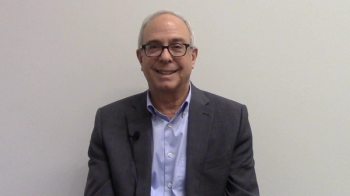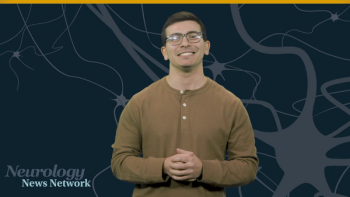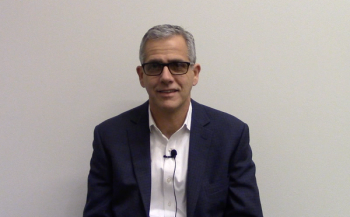
Here's some of what is coming soon to NeurologyLive® this week.

The Baldwin Keyes professor of neurology at Thomas Jefferson University, spoke with us at the 2022 AES Conference about the definition of a seizure. [WATCH TIME: 3 minutes]

Test your neurology knowledge with NeurologyLive®'s weekly quiz series, featuring questions on a variety of clinical and historical neurology topics. This week's topic is Alzheimer disease and dementia.

A study reported a rare case of seronegative NMOSD with a middle-aged man in Nepal who did not improve in clinical status and performance after given treatment.

For the first time ever, investigators identified a treatment benefit that extends the time to clinical conversion in RIS and reduces new or newly-enlarging T-weighted hyperintense lesions.

After 2 months of treatment, findings showed more improvement in anxiety and mental status with acupuncture in patients with Parkinson Disease than those on sham acupuncture.

Neurology News Network for the week ending January 7, 2022. [WATCH TIME: 4 minutes]

Take 5 minutes to catch up on NeurologyLive®'s highlights from the week ending January 6, 2023.

Marketed as Leqembi, the agent was approved through the accelerated approval pathway and was based on a major study featuring almost 900 patients with early Alzheimer disease.

UCB’s rozanolixizumab received priority review on its biologic license application by FDA and expects feedback during the second quarter of 2023.

The executive vice president of Global Head of Research and Development at Jazz Pharmaceuticals, spoke on the results from the BECOME study presented at the 2022 AES Conference. [WATCH TIME: 6 minutes]

Findings from a large-scale trial of adults aged 65 and older with Parkinson disease showed that treatment with pimavanserin was associated with lower risk of mortality than other atypical antipsychotics.

Anand Patel, MD, CPI, chief medical officer at Conquest Research, spoke about the findings from the phase 2 RELIEF-DPN-1 trial assessing LX9211 in sleep health.

In the phase 3 Clarity AD trial, a 65-year-old patient treated with lecanemab died because of multiple cerebral hemorrhages after undergoing tissue plasminogen activator therapy for ischemic stroke.

A rare case report illustrated an 80-year-old man with aquaporin-4 antibody-positive NMOSD following a second dose of the Pfizer-BioNTech COVID-19 mRNA BNT162b2 vaccine.

The professor of neurology at the University of Toronto talked about 3 conditions that were discussed during the epilepsy therapies symposium at the 2022 AES Conference. [WATCH TIME: 5 minutes]

The increased risk of dementia in patients showing early orthostatic hypotension was independent of the presence of concomitant supine hypertension and other factors associated with cognitive impairment.

With this new approval, the Zoom RDL becomes the newest addition to Imperative’s Zoom Stroke Solution, a complete stroke system designed for effective clot removal in ischemic stroke.

The professor of clinical geriatric epidemiology at Karolinska Institutet discussed strategies for lowering the risk of Alzheimer disease, and the new ways to approach prevention. [WATCH TIME: 4 minutes]

Data from a cohort of nearly 100 patients with Parkinson disease suggest there are shared nondopaminergic pathogenic mechanisms between depression and postural instability symptoms of the disease.

The professor of neurology at the University of Toronto spoke at the 2022 AES Conference about genetic approaches to comorbidities for patients with epilepsy. [WATCH TIME: 5 minutes]

The director of the Montefiore Einstein Center for the Aging Brain provided perspective on a new study assessing the use of a novel tool aimed to confirm patients’ cognitive complaints and issues with mobility.

Catch up on any of the neurology news headlines you may have missed over the course of the last month, compiled all into one place by the NeurologyLive® team.

A recent congressional investigation report on Biogen’s aducanumab and the FDA’s approval process recommended Biogen to fulfill their responsibility for individuals who rely on their treatments.

Patients with high dysautonomia scores showed significantly slower walking speed, decreased cadence, and shorter stride but increased time than the lower scored group in backward gait.

The director of research at the TSC Alliance spoke with us at the 2022 AES Conference about future research to be conducted on patients with TSC such as the PREVeNT trial. [WATCH TIME: 6 minutes]

After years of failed drug development, the thoughts of disease-modifying therapies for Alzheimer disease are starting to become real.

Results from a prospective study demonstrated a higher visual field defect in patients with neuromyelitis optica spectrum disorder-optic neuritis compared with those who had idiopathic optic neuritis.

The professor of clinical geriatric epidemiology at Karolinska Institutet discussed a subgroup analysis of the FINGERS trial and the clinical utility of the precursor to serum brain-derived neurotrophic factor. [WATCH TIME: 3 minutes]

The case-control study identified numerous motor symptoms and signals that are associated with Parkinson disease diagnosis years after they begin to occur.